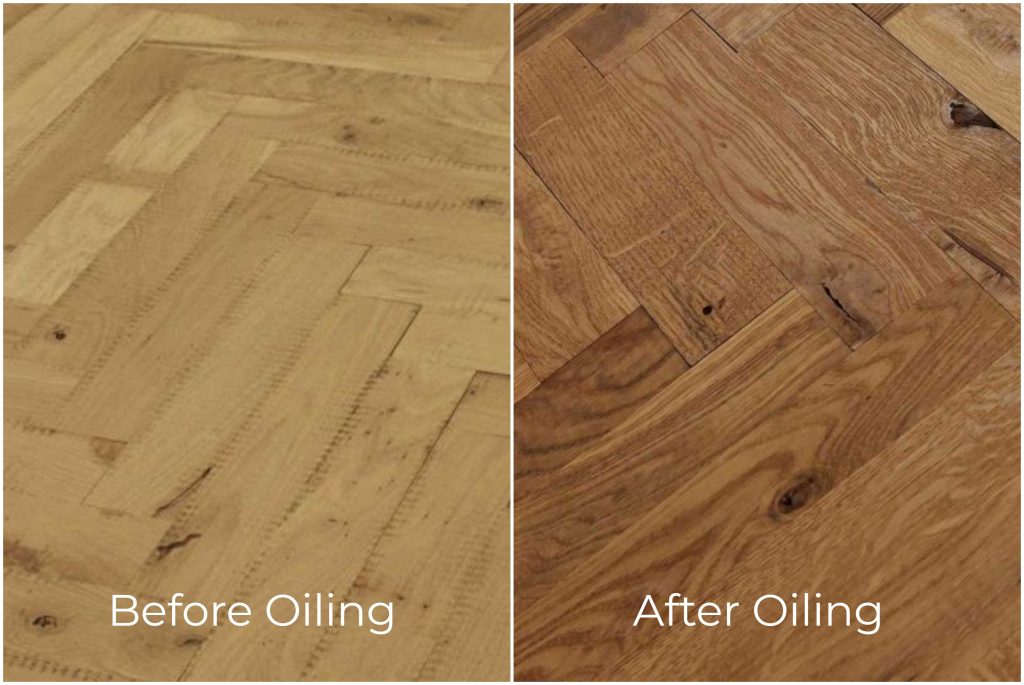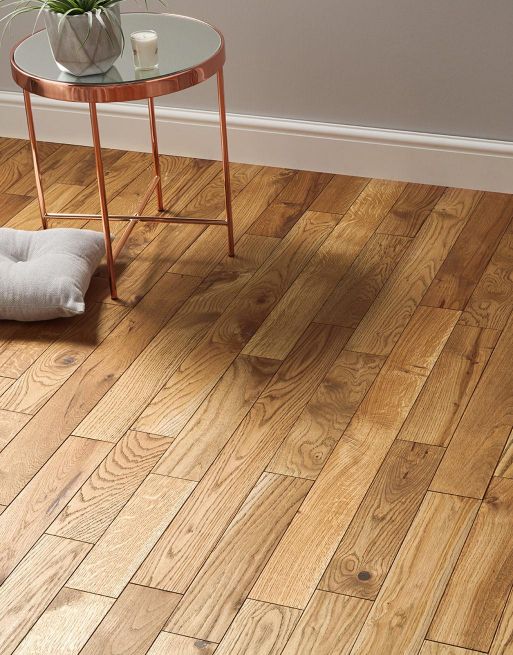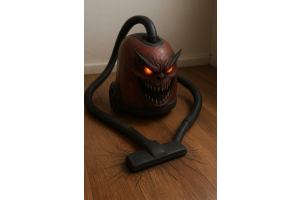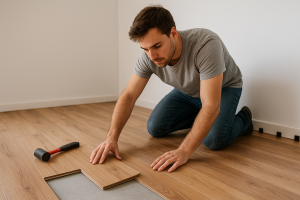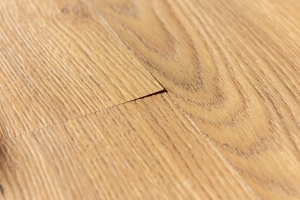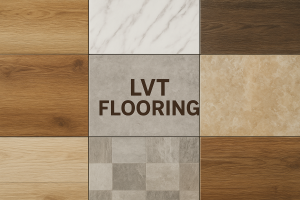
Over time, your wood floor may start to lose the sheen and colour that it once had. This is very likely down to the fact that your floor needs refreshing and reviving with oil. Oiling wood floors helps to enhance the overall appearance of its surface, as well as adding protection and nourishment.
If you want to oil wooden flooring, it's important to consider its benefits, the proper steps to take, and how often you should replenish its coat.
Why is it Important to Oil Your Wood Floor?
Firstly, oiled wood flooring helps with its longevity. The oil revives the appearance of the floor. It also protects the floor's surface, to keep it looking brand new for longer.
Your floor is thirsty
Wood flooring is thirsty. It may sound strange, but it’s true.
Without oil protecting the surface, your wood will drink up any water and moisture. If this water gets into the wood, the floor will move and can cause long-term damage.
On the other hand, with a protective oil coating, your floor is unable to soak up this moisture, therefore protecting your flooring.
Are you a pet owner?
The longevity and durability factors of oiling wood floors makes it perfect for pet owners. For instance, any scratches caused by claws or teeth can simply be sanded down and oiled over.
A lacquered floor, in comparison, is less of a quick fix when it comes to scratch marks.
Bringing out details in design
Oiled wood flooring brings out the amazingly fine details and grains of each plank. This, as a result, provides a wide range of tones and colours depending on the oil you use.
Our selection of Osmo Oils does a perfect job of making your flooring truly unique, offering warm, rustic tones, to lighter and more subtle finishes. Similarly, even clear oils can help show a floor’s natural beauty.
Floor protection
Unfinished wood flooring leaves vulnerability for liquid stains such as wine, cola, or sauce. A simple oiled finish prevents unwanted stains.
The oil itself acts as a protective layer, so that liquids can’t be absorbed into the wood’s fibres.
Prevent your floor from drying out and cracking
In extreme cases, your floor can crack due to the lack of oil that it receives on a regular basis. Although this is only in extreme circumstances, it's important to be mindful about the necessity of regularly oiling your wood floor.
Ongoing maintenance
Any form of hardwood flooring requires maintenance.
However, taking proper care of your oiled wood flooring means that you won’t need to re-sand and finish your floor too often.
Oiling your wood flooring should be part of your wood floor maintenance routine. We'll go into this more in a moment.
Quick re-cap:
- Helps with longevity.
- Protects against pet scratches.
- Quick and easy fix if any marks appear.
- Brings out detail, tone, and colour.
- Helps maintain the look of your floor
- More protection against liquid stains.
- Prevents your floor from drying out and cracking.
How to Oil Wooden Flooring
Below is a quick step-by-step guide on how to prepare and oil wooden flooring:
Prepare your flooring
- If your floor has previously been oiled, you can apply the oil directly on top. For floors with different finishes, such as varnish, you'll need to sand the surface until you get to the bare wood. This is to make sure you are not adding additional layers of a different oil onto a different existing layer.
- If you’re adding a touch-up layer after receiving new oiled flooring, you don’t need to sand it down. Whilst this is something we recommend, it is optional. You can apply the new coat straight on top, due to the fact that the oil is the same as the previous layer.
- Be sure to wipe away any kind of dirt or debris from the surface of your flooring, as this stops any debris from setting under the oil.
- Make sure the room is well ventilated. This is to make sure any fumes from the oil are able to escape, and not linger in the room.
The process
- Stir the container of oil thoroughly to make sure all of the components are well mixed
- Use a stiff brush or roller and apply the oil evenly, going with the wood grain. Be sure to apply the oil thinly, as to keep your layers even.
- Leave the oil to dry before applying more layers. Use the same technique as the step above and go with the grain, applying thin layers at a time
- Depending on the type of oil, use anywhere between 1 to 3 layers, making sure each layer is dry before applying a new one.
To ensure the best results for your oiled floor, always follow the manufacturer’s instructions. This should be located on the container of the product.
How Often Does Your Floor Need Oiling?
For domestic use, we recommend to oil wooden flooring every 2 years, you may want to do this sooner depending on how much your flooring is used.
This also adds an additional layer of protection from daily foot traffic or day-to-day mishaps that may damage your floor.
If you’re buying a range of flooring that comes oiled, whilst it is optional, we recommend oiling the floor again once it has been laid.
This is because your flooring could have been stored for a number of months, and maybe a little dry. Re-staining your new flooring tops up the slight moisture that is needed. By doing this, you can also add more colour to the finish and increase its durability.
Oiling Wood Floors FAQ
What types of oil can you use for wood flooring?
Bona hard wax oil: One of the most popular waxes available, bona is easy to apply and dries quickly. It’s highly effective at combatting wear and tear that you would commonly see in unfinished flooring, this makes it a great option for high amounts of foot traffic in your home.
WOCA hard wax oil: This particular oil is more expensive, but provides a more effective result. WOCA oil is more commonly used by professionals, who have the necessary machines to apply the oil correctly.
Blanchon maintenance oil: Blanchon is very effective at reviving wood flooring. Its matt finish results in a professional-looking result if you are doing this on your own. Blanchon oil is known for quick drying if time is of the essence.
GRANWAX hard wax oil: This oil is completely clear, providing a great form of protection, without altering the appearance of your wood. GRANWAX is a great option for preventing any signs of daily wear and tear from showing on your flooring.
Will oil change the colour of your floor?
This depends on the oil you choose. Some change the overall colour or tint of your flooring, on the other hand, some simply add a protective layer to its surface. If you are looking for an oil that provides a different tint, our ranges of tinted Osmo Oils offer a wide range of options.
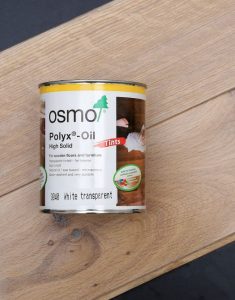 |
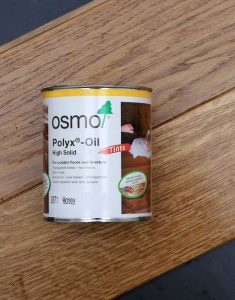 |
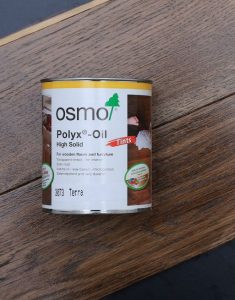 |
| Osmo Polyx Oil - White | Osmo Polyx Oil - Honey | Osmo Polyx Oil - Terra |
Should you oil wood flooring immediately?
We recommend that you oil wooden flooring as soon as possible after laying it. This is because the flooring can be slightly dried out during the storage period. Re-oiling acts as a little top up to the existing oil layer. This helps to bring some additional colour and tone, as well as added protection.
Do all floors need oiling?
Not all floors need oiling, however, there are a few specific factors to consider depending on what flooring you have.
If your wood flooring comes oiled, as previously mentioned, we recommend you re-oil your flooring with a clear finish. This re-hydrates the wood.
Lacquered wood flooring will need to be sanded down to the bare plank in order for it to be oiled. This is because of the lacquer acting as an already existing protective layer. The oil will not absorb into the wood if a lacquer finish is already present.
Engineered wood flooring features a solid wood veneer as the surface of the plank. This means that you can apply oil to the planks of engineered wood, however make sure that the flooring does not have a lacquered finish already applied. Otherwise, you will need to sand down the veneer before applying the oil.
Laminate, LVT, Vinyl, and EvoCore flooring cannot be oiled, as they have no wood surface for the oil to absorb in to.
How do you maintain oiled hardwood floors?
To maintain your wood floor, we recommend our Impero Elite Wood Flooring Kit. This kit is efficient and effective at both reviving and maintaining the look of your wood floor. Included in this kit is our Reviving Wax, which provides optimum protection for your wood flooring.
To Conclude
Overall, the benefits of oiling wood floors are very important to know. As well as preparing your flooring for a new coat, using the procedures will guarantee the best outcome. As long as you keep on top of your flooring maintenance, your wood flooring will look much better and last a whole lot longer. It’s a no-brainer!









